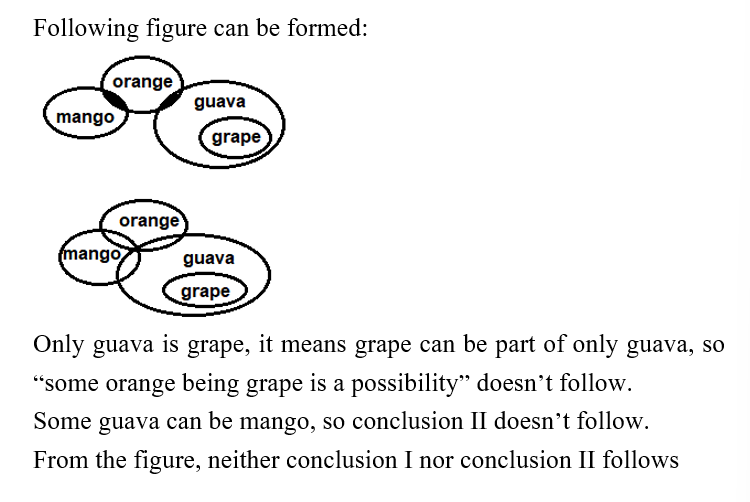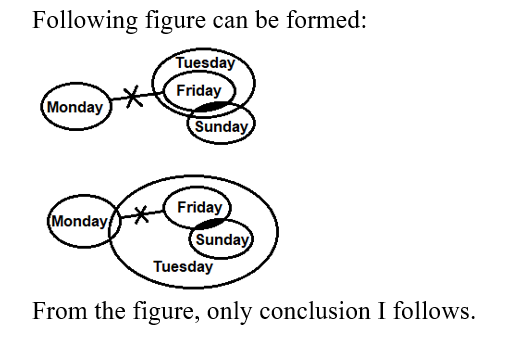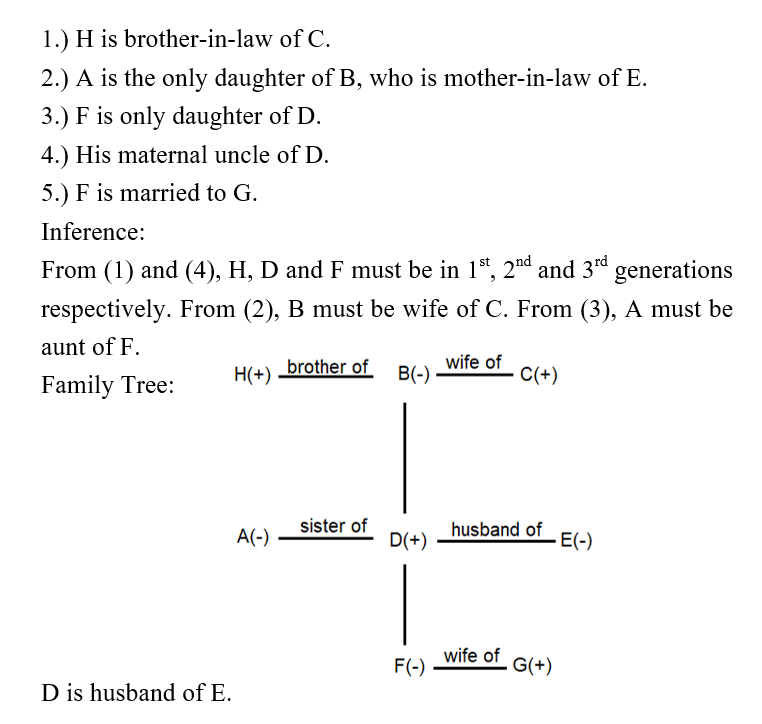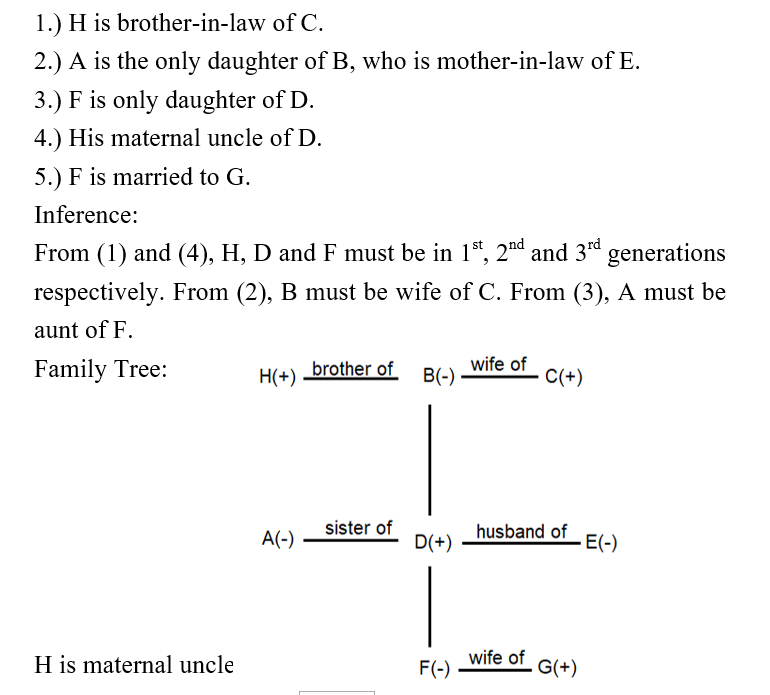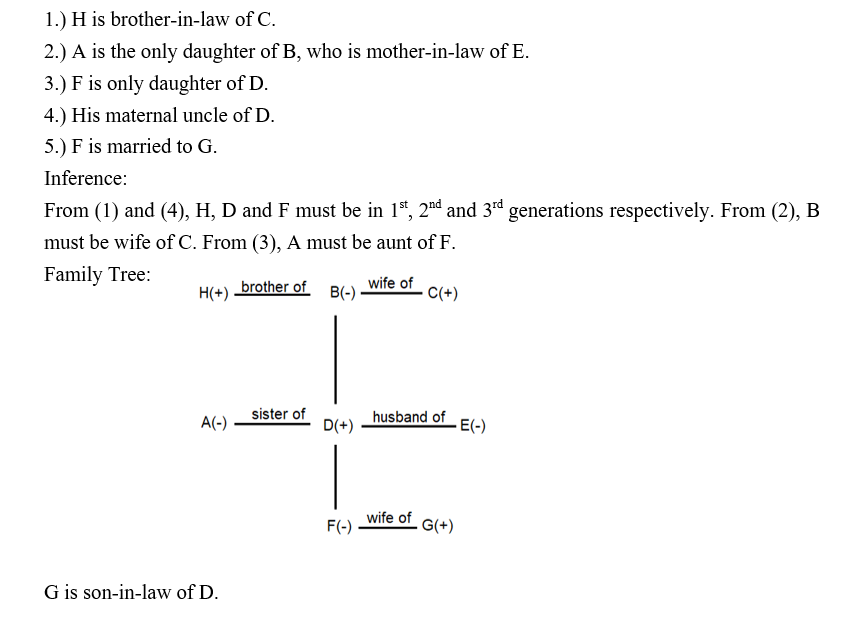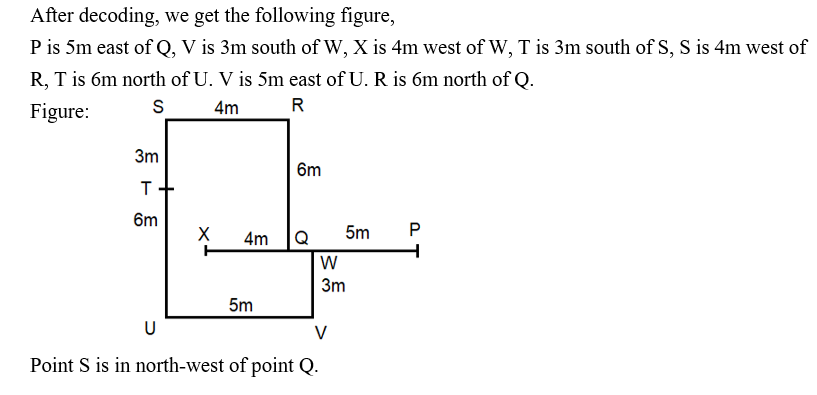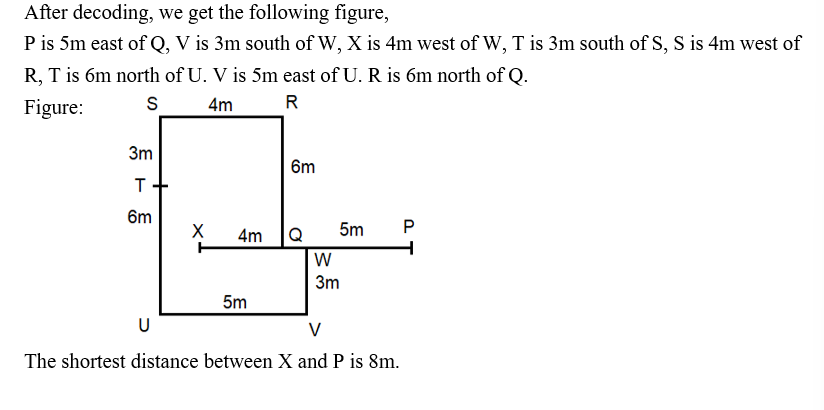Question 1:
Direction: In the question below there are three statements followed by two conclusions I and II. You have to take the three given statements to be true even if they seem to be at variance from commonly known facts and then decide which of the given conclusions logically follows from the three statements disregarding commonly known facts.
निर्देश: प्रश्न में, तीन कथन और उसके बाद दो निष्कर्ष I और II दिए गए हैं। आपको दिए गए तीन कथनों को सत्य मानना है, भले ही वे सामान्य रूप से ज्ञात तथ्यों से भिन्न दिखाई देते हों और फिर तय करें कि दिए गए निष्कर्षों में से कौन-सा निष्कर्ष सामान्य रूप से ज्ञात तथ्यों की अवहेलना करते हुए तीन कथनों का तार्किक रूप से अनुसरण करता है।
Statements: Only a few mango is orange
कथन: केवल कुछ आम संतरा है
Only few orange is guava
केवल कुछ संतरा अमरुद है
Only guava is grape
केवल अमरुद अंगूर है
Conclusions: I. Some orange being grape is a possibility
निष्कर्ष: I. कुछ संतरा के अंगूर होने की संभावना है
II. No guava is mango
II. कोई अमरुद आम नहीं है
(A) Only conclusion II follows
(A) केवल निष्कर्ष II अनुसरण करता है
(B) Only conclusion I follows
(B) केवल निष्कर्ष I अनुसरण करता है
(C) Neither conclusion I nor conclusion II follows
(C) न तो निष्कर्ष I और न ही निष्कर्ष II अनुसरण करता है
(D) Both conclusion I and conclusion II follow.
(D) निष्कर्ष I और निष्कर्ष II दोनों अनुसरण करते हैं।
(E) None of the above
(E) उपर्युक्त कोई नहीं
Question 2:
Direction: In the question below there are three statements followed by two conclusions I and II. You have to take the three given statements to be true even if they seem to be at variance from commonly known facts and then decide which of the given conclusions logically follows from the three statements disregarding commonly known facts.
निर्देश: प्रश्न में, तीन कथन और उसके बाद दो निष्कर्ष I और II दिए गए हैं। आपको दिए गए तीन कथनों को सत्य मानना है, भले ही वे सामान्य रूप से ज्ञात तथ्यों से भिन्न दिखाई देते हों और फिर तय करें कि दिए गए निष्कर्षों में से कौन-सा निष्कर्ष सामान्य रूप से ज्ञात तथ्यों की अवहेलना करते हुए तीन कथनों का तार्किक रूप से अनुसरण करता है।
Statements: No Monday is Friday
कथन: कोई सोमवार शुक्रवार नहीं है
All Friday is Tuesday
सभी शुक्रवार मंगलवार है
Only a few Sunday is Friday
केवल कुछ रविवार शुक्रवार हैं
Conclusions: I. Some Tuesday being Monday is a possibility
निष्कर्ष: I. कुछ मंगलवार के सोमवार होने की संभावना है
II. All Sunday is Tuesday
II. सभी रविवार मंगलवार है
(A) Neither conclusion I nor conclusion II follows
(A) न तो निष्कर्ष I और न ही निष्कर्ष II अनुसरण करता है
(B) Only conclusion I follows
(B) केवल निष्कर्ष I अनुसरण करता है
(C) Only conclusion II follows
(C) केवल निष्कर्ष II अनुसरण करता है
(D) Both conclusion I and conclusion II follow.
(D) निष्कर्ष I और निष्कर्ष II दोनों अनुसरण करते हैं।
(E) None of the above
(E) उपर्युक्त कोई नहीं
Question 3:
Directions: Answer the questions based on the information given below.
निर्देश: दिए गए जानकारी के आधार पर सवालों के उत्तर दें।
There are eight members A, B, C, D, E, F, G and H in the family of three generations. No single person has a child. His brother-in-law of C. A is the only daughter of B, who is mother-in-law of E. F is only daughter of D. His maternal uncle of D. F is married to G.
तीन पीढ़ी के एक परिवार में आठ सदस्य A, B, C, D, E, F, G और H है। किसी एकल अभिवावक का कोई बच्चा नहीं है। H C का साला/जीजा/देवर है। A B की इकलौती पुत्री है और B E की सास है। F D की इकलौती पुत्री है। H D का मामा है। F G से विवाहित है।
Who among the following is husband of E?
निम्नलिखित में से कौन E का पति है?
Question 4:
Directions: Answer the questions based on the information given below.
निर्देश: दिए गए जानकारी के आधार पर सवालों के उत्तर दें।
There are eight members A, B, C, D, E, F, G and H in the family of three generations. No single person has a child. His brother-in-law of C. A is the only daughter of B, who is mother-in-law of E. F is only daughter of D. His maternal uncle of D. F is married to G.
तीन पीढ़ी के एक परिवार में आठ सदस्य A, B, C, D, E, F, G और H है। किसी एकल अभिवावक का कोई बच्चा नहीं है। H C का साला/जीजा/देवर है। A B की इकलौती पुत्री है और B E की सास है। F D की इकलौती पुत्री है। H D का मामा है। F G से विवाहित है।
How is H related to A?
H A से कैसे सम्बंधित है?
Question 5:
Directions: Answer the questions based on the information given below.
निर्देश: दिए गए जानकारी के आधार पर सवालों के उत्तर दें।
There are eight members A, B, C, D, E, F, G and H in the family of three generations. No single person has a child. His brother-in-law of C. A is the only daughter of B, who is mother-in-law of E. F is only daughter of D. His maternal uncle of D. F is married to G.
तीन पीढ़ी के एक परिवार में आठ सदस्य A, B, C, D, E, F, G और H है। किसी एकल अभिवावक का कोई बच्चा नहीं है। H C का साला/जीजा/देवर है। A B की इकलौती पुत्री है और B E की सास है। F D की इकलौती पुत्री है। H D का मामा है। F G से विवाहित है।
How is G related to D?
G D से कैसे सम्बंधित है?
Question 6:
Direction: In the question, assuming the given statements to be true, find which of the conclusion (s) among given three conclusions is /are definitely true and then give your answer accordingly.
निर्देश: निम्नलिखित प्रश्न में, दिए गए कथनों को सत्य मानकर, यह तय करना है कि दिए गए तीन निष्कर्षों में से कौन सा निष्कर्ष निश्चित रूप से सत्य है और फिर उसी अनुसार अपना उत्तर दें।
Statements: P > S < V; S > N ≥ D; W < D
Conclusions: I. P > D II. W < S
III. P > V
(A) Only conclusion I is true
(A) केवल निष्कर्ष I सत्य है
(B) Only conclusions I and II are true
(B) केवल निष्कर्ष I और II सत्य है
(C) Only conclusion III is true
(C) केवल निष्कर्ष III सत्य है
(D) All conclusions I, II and III are false
(D) सभी निष्कर्ष I, II और III गलत है
(E) Only conclusions II and III are true
(E) केवल निष्कर्ष II और III सत्य है
Question 7:
Direction: In the question, assuming the given statements to be true, find which of the conclusion (s) among given three conclusions is /are definitely true and then give your answer accordingly.
निर्देश: निम्नलिखित प्रश्न में, दिए गए कथनों को सत्य मानकर, यह तय करना है कि दिए गए तीन निष्कर्षों में से कौन सा निष्कर्ष निश्चित रूप से सत्य है और फिर उसी अनुसार अपना उत्तर दें।
Statements: X > M ≥ N; Q > J ≤ N; U < J
Conclusions: I. X > U II. X < Q
III. U ≤ Q
(A) Only conclusion I is true
(A) केवल निष्कर्ष I सत्य है
(B) Only conclusions I and II are true
(B) केवल निष्कर्ष I और II सत्य है
(C) Only conclusion III is true
(C) केवल निष्कर्ष III सत्य है
(D) All conclusions I, II and III are false
(D) सभी निष्कर्ष I, II और III गलत है
(E) Only conclusions II and III are true
(E) केवल निष्कर्ष II और III सत्य है
Question 8:
Directions : Answer the questions based on the information given below.
निर्देश: दिए गए जानकारी के आधार पर सवालों के उत्तर दें।
If M@N means M is 5m east of N
यदि M@N का अर्थ है M N के 5 मी पूर्व में है
M&N means M is 4m west of N
M&N का अर्थ है M N के 4 मी पश्चिम में है
M+N means M is 6m north of N
M+N का अर्थ है M N के 6 मी उत्तर में है
M #N means M is 3m south of N
M #N का अर्थ है M N के 3 मी दक्षिण में है
P @ Q, V # W, X&W, T # S, S & R, T + U, V@U, R+Q
In which direction is point S with respect to point Q?
बिंदु Q के सन्दर्भ में बिंदु S किस दिशा में है?
Question 9:
Directions : Answer the questions based on the information given below.
निर्देश: दिए गए जानकारी के आधार पर सवालों के उत्तर दें।
If M@N means M is 5m east of N
यदि M@N का अर्थ है M N के 5 मी पूर्व में है
M&N means M is 4m west of N
M&N का अर्थ है M N के 4 मी पश्चिम में है
M+N means M is 6m north of N
M+N का अर्थ है M N के 6 मी उत्तर में है
M #N means M is 3m south of N
M #N का अर्थ है M N के 3 मी दक्षिण में है
P @ Q, V # W, X&W, T # S, S & R, T + U, V@U, R+Q
What is the shortest distance between X and P?
X और P के बीच की न्यूनतम दूरी कितनी है?
Question 10:
If a meaningful word is formed by using the 1st, 5th, 7th, and 9th letter (from the left end) of the word ‘ALGORITHM’ then which of the following will be second letter of the word formed from the left end. If more than one such meaningful word is formed mark ‘Z’ as your answer. If no meaningful word is formed, mark ‘X’ as your answer?
यदि शब्द 'ALGORITHM' के पहले, पांचवें, सातवें और नौवें अक्षर (बाएं छोर से) का उपयोग करके एक सार्थक शब्द बनाया जाता है, तो निम्नलिखित में से कौन निर्मित शब्द के बाएं छोर से दूसरा अक्षर होगा, यदि ऐसे एक से अधिक अर्थपूर्ण शब्द बनते हैं तो अपने उत्तर के रूप में 'Z' चिह्नित करें। यदि कोई सार्थक शब्द नहीं बनता है, तो 'X' को अपने उत्तर के रूप में चिह्नित करें?

